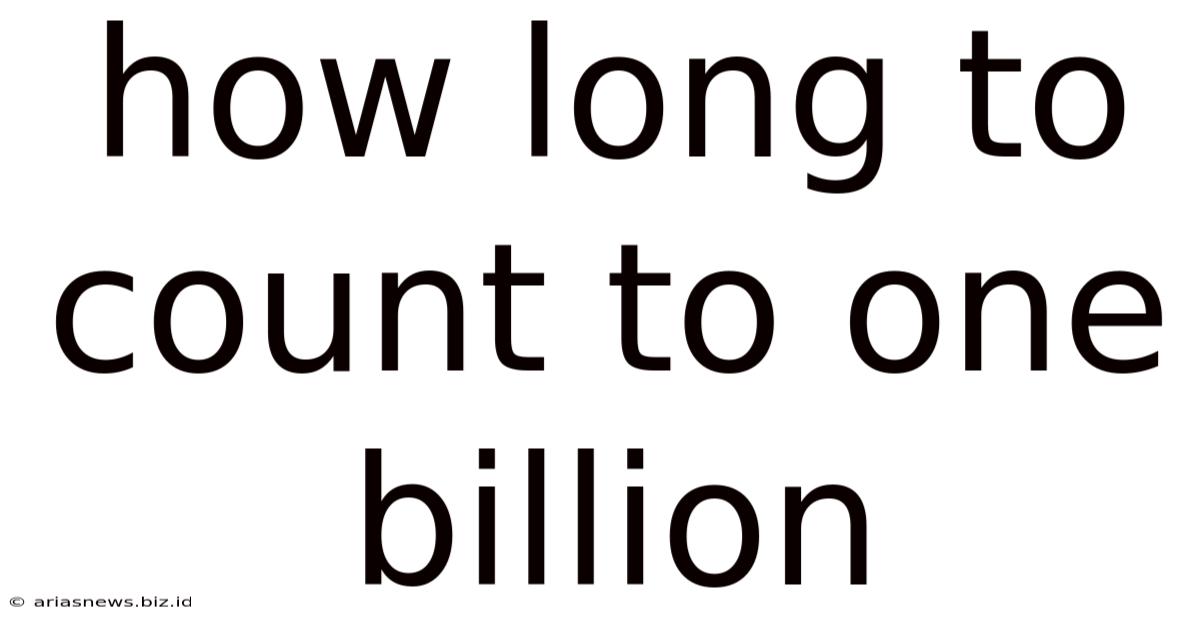How Long To Count To One Billion
Arias News
May 10, 2025 · 4 min read

Table of Contents
How Long Would It Take to Count to One Billion? A Deep Dive into Time, Patience, and the Immensity of Numbers
Have you ever wondered how long it would take to count to one billion? It's a question that sparks curiosity, highlighting the vastness of numbers and the limitations of human endurance. This isn't just a simple math problem; it's an exploration into the concepts of time, scale, and the sheer impossibility of such a feat. Let's delve into the fascinating details.
The Straightforward Calculation: Assuming Perfect Conditions
The most straightforward approach is to calculate the time based on a consistent counting rate. Let's assume you can count one number per second. This seems reasonable, accounting for the pronunciation and mental processing time.
One Number Per Second
At one number per second, counting to one billion would take:
- 1,000,000,000 seconds
To put this into more manageable units:
- Divide by 60: This gives us approximately 16,666,667 minutes.
- Divide by 60 again: This translates to roughly 277,778 hours.
- Divide by 24: This results in approximately 11,574 days.
- Divide by 365 (approximately): This equals approximately 31.7 years.
Therefore, under ideal conditions, counting to one billion at a rate of one number per second would take approximately 31.7 years.
The Reality: Imperfections and Human Limitations
The above calculation paints a simplified picture. Reality is far more complex. Human beings are not machines; we need breaks, sleep, food, and rest. Let's consider these factors:
Sleep and Breaks
Even with unwavering dedication, you'd need to sleep. Assuming 8 hours of sleep per day, this adds significant time to the overall count. Let's recalculate:
- Counting hours per day: 16 hours (24 hours - 8 hours sleep)
- Total counting days: 277,778 hours / 16 hours/day ≈ 17,361 days
- Total counting years (accounting for sleep): 17,361 days / 365 days/year ≈ 47.6 years
Adding sleep alone extends the timeframe to roughly 47.6 years.
Other Necessary Breaks
Beyond sleep, we need time for meals, bathroom breaks, and other essential activities. Even short breaks add up significantly over such an extended period. Let's be conservative and assume an additional hour of breaks per day:
- Counting hours per day: 15 hours (24 hours - 8 hours sleep - 1 hour breaks)
- Total counting days: 277,778 hours / 15 hours/day ≈ 18,518 days
- Total counting years (with sleep and breaks): 18,518 days / 365 days/year ≈ 50.7 years
Now, the estimation is closer to 50.7 years.
The Mental Toll
Counting to one billion is not merely a physical task; it's a monumental mental undertaking. The monotony could lead to errors, requiring recounts, further increasing the overall time. Furthermore, the sheer mental fatigue could necessitate even more frequent breaks, adding to the overall timeline.
External Factors
Unforeseen circumstances like illnesses, accidents, or simply needing to take a break for extended periods due to mental exhaustion would significantly impact the timeframe. These are unpredictable events that cannot be easily factored into the calculation.
The Impossibility of the Task
Based on the calculations and the inclusion of realistic human limitations, it becomes clear that counting to one billion is practically impossible for a single individual. The sheer time commitment and the mental and physical strain involved make it an insurmountable challenge.
Alternative Approaches and Perspectives
While counting to one billion by oneself is unrealistic, let's explore other perspectives:
Team Effort
A team of people could theoretically divide the counting task, significantly reducing the overall time. However, coordinating such a massive undertaking and ensuring accuracy would present its own set of logistical challenges.
Automation
Utilizing a computer program is the most efficient way to "count" to one billion. A simple program could achieve this in a matter of seconds. This highlights the significant difference between human capabilities and the power of technology.
The Significance of the Exercise
The seemingly simple question of counting to one billion reveals a great deal about the scale of large numbers, the limitations of human endurance, and the transformative power of technology. It's a thought experiment that encourages us to appreciate the immensity of numbers often taken for granted and consider the practical challenges of such ambitious undertakings.
Conclusion: A Journey Beyond Numbers
While counting to one billion is practically impossible for a human being, the exercise is valuable. It helps us understand the limitations of human capabilities in relation to the immense scale of numbers we encounter in various fields like science, finance, and technology. It serves as a reminder of the efficiency and capabilities of modern technology in tackling tasks that are beyond human reach. The journey of exploring this seemingly simple question opens up a world of insights into time, scale, and the power of human ingenuity. It's a fascinating reminder of the vastness of the universe and the limitations, yet also the remarkable capabilities, of human beings.
Latest Posts
Latest Posts
-
Is There 16 Oz In A Pound
May 10, 2025
-
Who Was With Mary When Jesus Was Crucified
May 10, 2025
-
Type The Number 1340000 In Scientific Notation
May 10, 2025
-
When Will Easter Fall On April 2nd
May 10, 2025
-
How Many Fl Oz Are In A Bottle Of Water
May 10, 2025
Related Post
Thank you for visiting our website which covers about How Long To Count To One Billion . We hope the information provided has been useful to you. Feel free to contact us if you have any questions or need further assistance. See you next time and don't miss to bookmark.